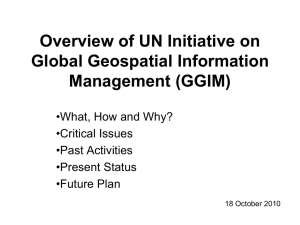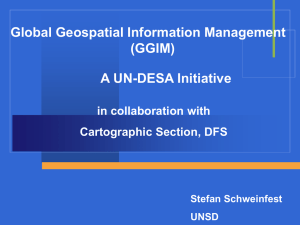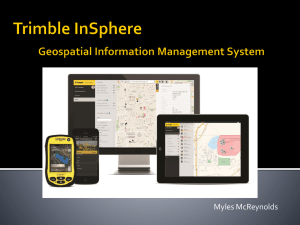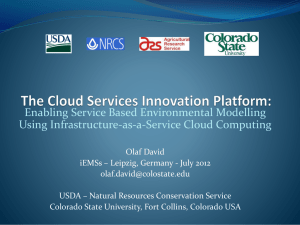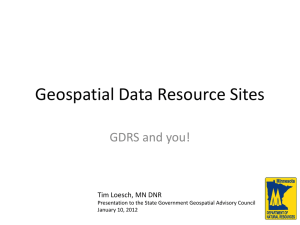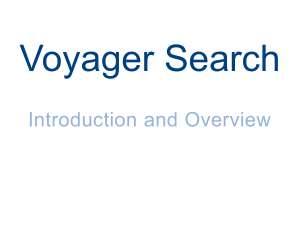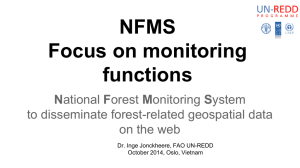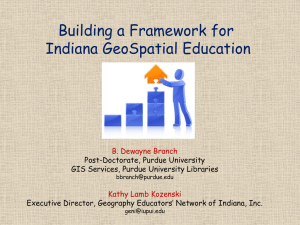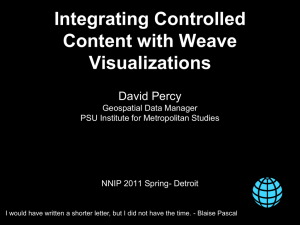UN-GGIM - Group on Earth Observations
advertisement
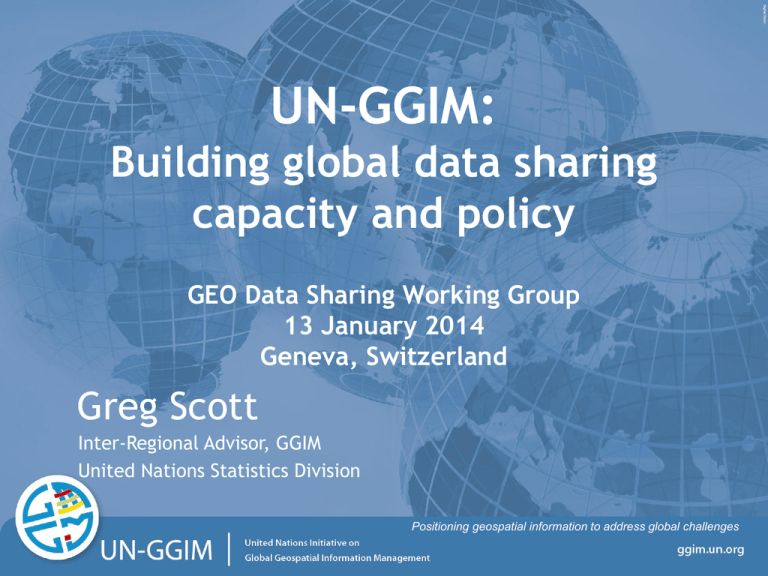
UN-GGIM: Building global data sharing capacity and policy GEO Data Sharing Working Group 13 January 2014 Geneva, Switzerland Greg Scott Inter-Regional Advisor, GGIM United Nations Statistics Division Positioning geospatial information to address global challenges ggim.un.org UN-GGIM: A global initiative Formal inter-governmental UN Committee of Experts to: • • • • • Discuss, enhance and coordinate Global Geospatial Information Management activities by involving Member States at the highest level. Reports to ECOSOC Make joint decisions and set directions on the use of geospatial information within national and global policy frameworks Work with Governments to improve policy, institutional arrangements, and legal frameworks Address global issues and contribute collective knowledge as a community with shared interests and concerns Develop effective strategies to build geospatial capacity in developing countries Positioning geospatial information to address global challenges ggim.un.org UN-GGIM: Program of activities • Future Trends and Inventory of Issues • Develop baselines - policy and legal, institutional arrangements, governance, methodologies Sustaining the global geodetic reference frame Implement and adopt international standards and interoperability Establishing a global geospatial information platform for sustainable development: Post-2015 development agenda Information integration – land, marine, environment, urban hazards, statistics Implement a global-regional architecture for UN-GGIM • • • • • Positioning geospatial information to address global challenges ggim.un.org UN-GGIM: Developments in data sharing Decisions – 3rd Session of the Committee of Experts, July 2013 • Global geodetic reference frame: – Need to improve global cooperation within geodesy, including to openly share data to contribute to regional and global reference frames – Preparing a draft resolution for GA to ensure long-term sustainability – Urges Member States to implement open geodetic data sharing through relevant national mechanisms and inter-governmental cooperation and coordination • Legal and policy frameworks: – Significant legal and policy challenges emerging for geospatial information, including issues related to data licensing, sharing, pricing, privacy, quality, liability, authority, security and open data – Reach out to the International Bar Association regarding their current work on a draft Convention on Geoinformation – Work with the Centre for Spatial Law and Policy and Member States, building on the work of regional entities and other relevant fora such as GEO http://ggim.un.org/docs/meetings/3rd%20UNCE/GGIM_3%20final%20report%209%20Aug_FINAL.pdf Positioning geospatial information to address global challenges ggim.un.org Proposed Convention on Geoinformation • Initiated by the International Bar Association: “We need to have proper account of the military, environmental and humanitarian aspects of the geoinformation issue” • Draws on, inter alia, 1986 UN Principles relating to Remote Sensing, GEO, EARSC, etc • Intended to apply to all geoinformation, collected from whatever source, for whatever purpose • Trying to address in one document a number of complex issues that are critical to the geospatial community – such as privacy, data quality, intellectual property rights, and national security • Could result in a number of new regulations and burdens on industry and some governments with respect to the collection, use and distribution of geoinformation • Could increase potential liability risks for industry (and some government agencies) and would likely dampen the willingness of individuals to contribute geoinformation due to liability concerns Positioning geospatial information to address global challenges ggim.un.org UN-GGIM: Developments in data sharing Decisions – 3rd Session of the Committee of Experts, July 2013 • Implementation of standards for the global GI community: – Stressed the importance of implementing and adopting standards within national legal and policy frameworks for effective data sharing – Work with the standardization bodies (ISO/TC211, OGC, IHO) to develop and communicate core essential standards • Linking geospatial information to statistics and other data: – Critical to integrate geospatial information with statistics and socio-economic data and develop a ‘geospatial-statistical framework’, especially in the context of the on-going debate on the post-2015 development agenda – Expert Group created and International Conference planned for August 2014. Address issues such as institutional arrangements and standards that would facilitate better data integration http://ggim.un.org/docs/meetings/3rd%20UNCE/GGIM_3%20final%20report%209%20Aug_FINAL.pdf Positioning geospatial information to address global challenges ggim.un.org UN-GGIM: Developments in data sharing Decisions – 3rd Session of the Committee of Experts, July 2013 • Global map for sustainable development: – Requested to provide a clear understanding of the needs and requirements of the sustainable development user community – Engage the UN Open Working Group on SDGs. Side event convened during the Seventh Session of the OWG • Activities on GI within the United Nations system: – Urged international organizations and agencies, within and outside the UN system, which collect geospatial data from countries to make them available in a transparent and coordinated manner, while respecting the need to keep the efforts technical in nature, so as to not raise political concerns – Stressed the need for better coordination and clarification of roles and responsibilities of geospatial information management activities, both within and outside the UN system, and requested the Secretariat and UNGIWG to work together and report back to the Committee http://ggim.un.org/docs/meetings/3rd%20UNCE/GGIM_3%20final%20report%209%20Aug_FINAL.pdf Positioning geospatial information to address global challenges ggim.un.org In conclusion… • GEO Secretariat participated in 3rd Session of UN-GGIM. Strategic relationship between UN-GGIM and GEO is seen as being valuable • UN-GGIM and GEO share some important common goals and objectives in setting the global agenda for the development and use of geospatial data and information to address key global challenges, including sustainable development • In many cases we interact with the same agencies and individuals – Member States, UN system, international organizations, private sector • We may operate in different trade spaces, but when they touch each other we should be coordinated. Member States are wanting this Positioning geospatial information to address global challenges ggim.un.org Thank You scott12@un.org http://ggim.un.org Positioning geospatial information to address global challenges ggim.un.org
